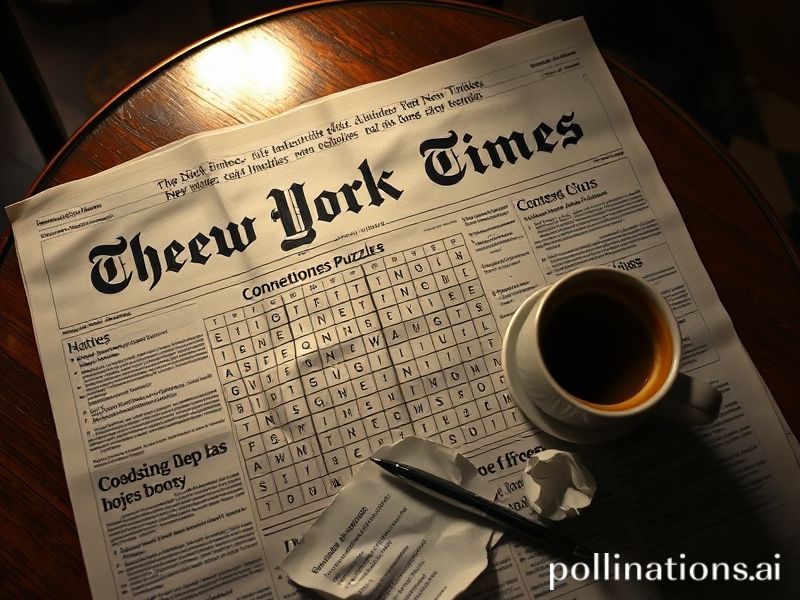From Reykjavik to Lagos: How the NYT Connections Puzzle Became the World’s Briefest Therapy Session
Global Puzzle Panic: How a New York Times Grid Became the Planet’s Favorite Five-Minute Existential Crisis
By the time the sun rose over Reykjavik on September 23, half of Finland had already solved the NYT Connections grid, posted their streak on X, and gone back to pretending their national happiness index isn’t a polite fiction. By sunset in Santiago, Chilean students were arguing in cafés about whether “WHALE” belongs with mammals or currency—a debate that quickly spiraled into a referendum on neoliberalism and the price of lattes. Somewhere in Lagos, a commuter stuck in Third Mainland Bridge traffic tapped out the winning quartet on her cracked phone screen and felt, for exactly 4.7 seconds, that the universe was briefly ordered. Then the traffic lurched forward and the feeling evaporated, as feelings do.
The premise is absurdly simple: sixteen words, four secret categories, one smug little “Congratulations!” animation. Yet the international uptake has been faster than a crypto crash. Why? Because in a year when glaciers file their resignation letters and election cycles feel like recurring nightmares, the promise that everything has a tidy, discoverable category is the opiate of the laptop class. We click, we sort, we tell ourselves that if “BASS” can sit harmoniously beside “SOLE,” perhaps NATO can too.
Across time zones, the ritual looks the same. In Seoul, an office worker hides the game behind a spreadsheet; in Paris, a philosophy professor insists the puzzle proves structuralism still matters—nobody has the heart to tell him the algorithm was trained on Reddit memes. Meanwhile, in Damascus, a teenager uses a VPN to reach the Gray Lady’s games page, quietly savoring the irony that the paper which once chronicled his country’s implosion now offers him daily micro-victories in pastel boxes.
The September 23 edition was, by consensus of the chronically online, a “banger.” Category one lulled solvers into botanical smugness; category two weaponized homophones with the subtlety of a drone strike; category three dabbled in 1980s soft-rock references, instantly aging half the global population out of the conversation; and the final group required a working knowledge of both Scrabble two-letter words and the emotional vocabulary of a divorce attorney. International solvers reported an average 2.3 minutes of self-loathing before the penny dropped—roughly the same duration as the British prime minister’s latest tenure.
Naturally, geopolitics intruded. Russian state television accused the puzzle of “Anglo-Saxon lexical imperialism.” The Chinese internet censors briefly blocked the game, then unblocked it when they realized the categories were already teaching Party-approved spelling. In Washington, a think-tank fellow published a 3,500-word essay arguing that the puzzle’s color-coded grid is a metaphor for the emerging multipolar world order; the essay was read by eleven people and a bored cat.
But the real revelation is how the game exposes the illusion of shared context. A word like “TANK” means one thing to a New Yorker picturing a gym top, another to a Kyiv resident picturing something altogether less breathable. When those contexts collide in a purple category, the frisson is almost educational—until you remember that education budgets everywhere are being slashed faster than you can say “semantic field.”
By midnight GMT, the global hive mind had dissected every clue, posted 47,000 screenshots of perfect four-guess victories, and resumed doom-scrolling. The planet spun on, slightly more united in its trivial distraction, slightly less sure whether that counts as progress. Somewhere, a server farm hummed, harvesting microseconds of human pattern recognition for reasons no one fully understands—least of all the people who just wanted to kill five minutes before the next quarterly earnings call.
And so the September 23 grid fades into collective muscle memory, another shared synaptic breadcrumb in the loaf of late-capitalist anxiety. Tomorrow there will be sixteen new words, four new boxes to tick, and the same desperate hope that somewhere, somehow, everything still connects.







